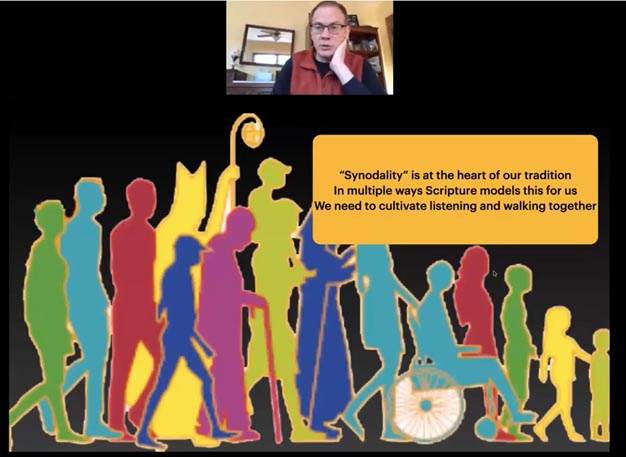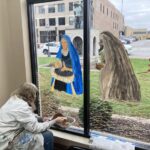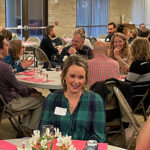
Micah Kiel talks about the vision of a Synodal Church during a Word of God gathering Jan. 23 online.
By Barb Arland-Fye
The Catholic Messenger
The word “journey” appears everywhere in the Bible, from Exodus to Emmaus, “people on the way, people traveling together,” said St. Ambrose University theologian Micah Kiel during the third annual diocesan gathering of Word of God Sunday.
“We need to remember the Bible is a community of voices,” he shared with his virtual audience Jan. 23. Kiel and two other theologians from the diocesan university in Davenport, Matthew Coomber and Ella Johnson, explored the Word of God as part of Pope Francis’ vision of a Synodal Church and the role of Scripture in discernment. Deacon Frank Agnoli, diocesan director of Liturgy, noted the appropriateness of the Word of Sunday gathering coinciding with the Week of Prayer for Christian Unity.
Kiel led participants on a journey through St. Paul’s letters and their significance in the time in which he preached and how his letters speak to the faithful today. In 1 Corinthians, for example, Paul walked with and understood the concerns of the Corinthians. “He wants all members of the community listened to and respected.”
Catholics’ beliefs are based in Scripture and Tradition, Kiel said. “God isn’t speaking only in Scripture but in the community of the time. Every voice needs to be at the table. That’s why we need the Synod. Synodality is at the heart of our Tradition.”
Coomber’s presentation focused on enriching the community and ourselves in conversation with the Bible. He began with a personal story about confiding to a friend his desire to become a biblical scholar. “Why would you spend your life studying children’s stories,” the friend asked Coomber. Her response broke his heart. Her education in the Bible had ended with children’s Bible stories.
“There’s a need to grow beyond our children’s Bibles. The way we teach children the Bible in Sunday school is perfect for that age, more often than not.” Coomber wondered, however, what happens when the faithful need to deal with grownup questions. “We tend to be more comfortable engaging in the light stuff, in the easy conversations. We tend to be more comfortable naturally engaging in the less controversial stuff (such as) don’t sin,” he said. “But where then, do we take it from there?” The Beatitudes, for example, are a huge challenge. “What do we do with those ‘Blessed ares’ that Jesus puts out before us, the core of Christian ethics?”
German theologian Dietrich Bonhoeffer (1906-1945) came to understand that the Beatitudes served as practicable instructions for Christian living. Engaging in Scripture in relation to Christians’ lived experiences “helps to quench the community’s thirst for deeper meaning,” Coomber said.
The texts, the stories invite people into conversation about life. “For conversation to happen we need community, we need to engage with one another.” He is encouraged by the emphasis on synodality in the Catholic Church now, the listening that is taking place. This is where growth takes place as individuals, societies and Church, he said.
Coomber says he shows his students how the Bible will help them wrestle with the big questions in life and counteract distortions of the Word that promote harmful ideologies, such as white supremacy. Engaging in Scripture “helps us live Christ in the world,” he said, referring to Pope Francis and the late Archbishop Desmond Tutu as models, and Catholic Relief Services, which puts the Bible into action.
“When we reflect on the word of God, we are all one people reflecting together, making our pilgrim way through history,” Johnson said in her presentation.
“In devoting ourselves to this day, we remind ourselves of the listening that should be happening every day” through Scripture, with God and with others.
Johnson structured her comments around three reflection questions:
• How do we as individuals listen to Scripture as members of the Christian community?
• How do we listen to one another (lay, ordained, the hierarchy)?
• How do the Scriptures help us in discerning “the Way, the Truth, and the Life” of Jesus Christ, particularly when voices contradict each other or when there are tensions in them?
The theology of the Church, particularly since Vatican II, underlines the importance of each individual in having a role to be a prophet, she said. Pope Francis was thinking along these lines when he called for a Synod on Synodality. “He wants to hear everyone’s voice. Every single member of the Church should be empowered. This is the theology of the Church, the Scriptures, and the Catechism.” By virtue of their baptism, each Christian shares in the threefold ministry of Jesus Christ’s priesthood, prophecy and kingship.”
God continues to speak to us in God’s word,” she said. We know through Scriptures that God’s word strengthens, supports, nourishes us. The Bible is alive. It sanctifies us, it can speak to us and so we should listen to it to see the way in which it is calling us, empowering us and challenging us to be prophets in our daily lives, in our work places, to the church around us.”
(Watch the video of the recording of Word of God Sunday gathering on YouTube: https://youtu.be/ Dtab0GWefkI)











